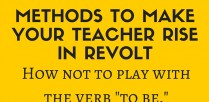Many words that sound the same have completely different meanings, and some words that sound the same have different spellings.
To download high-resolution poster click here
English, the Crazy Quilt Language
Before supermarkets, quilted blankets were made at home. When a quilter was low on materials, she would use whatever stray bits of material she had; the result was often a colorful, randomly-patterned creation called a “crazy”. As colorful as the people who speak it, English is a crazy quilt of tongues, influenced by languages from across the planet. Roots of common words can even come from languages no longer spoken, such as Latin. Because of this muddy heritage, many words from everyday use are confusing and simply need to be memorized.
Homonyms and Their Cousins
Words that sound alike but have different meanings are called homophones (deer/dear, to/two/too, flour/flower). Words that are spelled the same but have different meanings are called homographs (live, bear, rose). In the strictest definition, homonyms are both spelled alike and sound alike, but the term is popularly used for any words with different meanings that look alike, sound alike, or both. The words in these 3 groups can terrorize ESL students and native speakers, alike.
Affect vs. Effect
These similar-sounding words are often interchanged but have distinctly different uses.
Affect: (verb) to produce a change or an effect; to act upon.
Storms affected the crops.
My hunger affected my mood.
Effect: (noun) something that is the result of a cause; an outcome.
Flooding was an effect of the storms.
An effect of hunger is grumpiness.
Than vs. Then
There is a subtle pronunciation difference, but they are close enough, and frustrating enough, to include in our infographic.
Than: (conjunction) used for comparison.
My chicken lays more eggs than hers.
Miami is warmer than Anchorage.
Then: (adverb) relates order: next, immediately or soon after.
My chicken clucked, then it laid an egg.
I lived in Anchorage, then I moved to Miami.
Your vs. You’re
This pair of words is a notorious stumbling block.
Your: (pronoun) belonging to you.
Your chicken laid an egg.
I have your egg in my hand.
You’re: (contraction) a combination of you and are.
Unfortunately, you’re moving to Anchorage.
You’re better off living in Miami.
Their vs. There vs. They’re
The English language’s triple crown of confusion, these words could win an award for the amount of stress they cause.
Their: (pronoun) belonging to them.
They ate their cheeseburgers.
There: (adverb, noun/pronoun, adjective) that place or that point; at/to that place/point; also used for emphasis or as an interjection.
My cheeseburger is over there.
We went there for cheeseburgers.
That cheeseburger there is mine.
There! I ate my cheeseburger!
They’re: (contraction) a combination of they and are.
They’re asking for more mustard.
Our Crazy Quilt language is chock full of sound- and look-alike words. Are there any not listed here that you personally struggle with?



![Adjective and Adverb Phrases: Hints and Tips [infographic]](https://www.grammar.net/wp-content/uploads/2013/01/adjectives_adverbs_small-308x95.png)
![10 Idioms about knowledge [infographic]](https://www.grammar.net/wp-content/uploads/2013/03/idioms-about-knowledge_watermarked-308x95.png)


